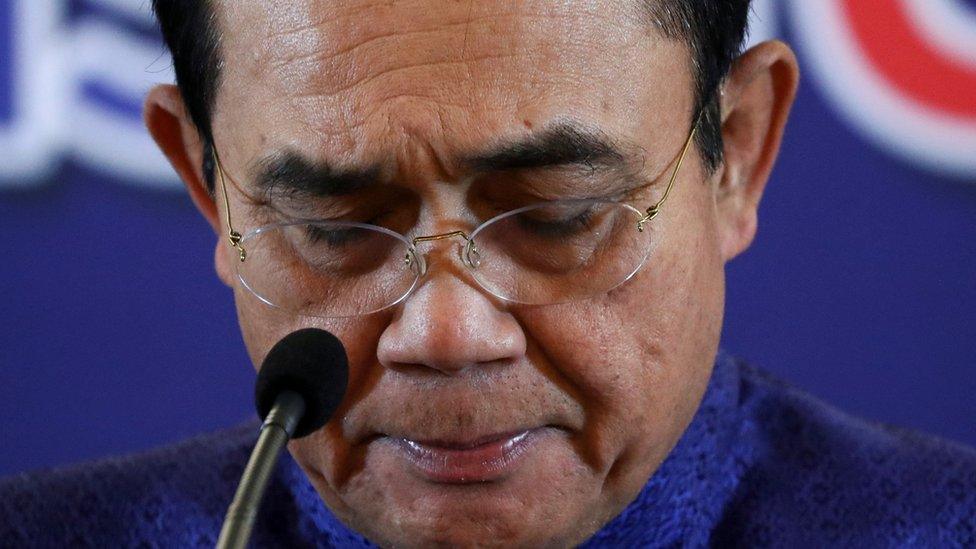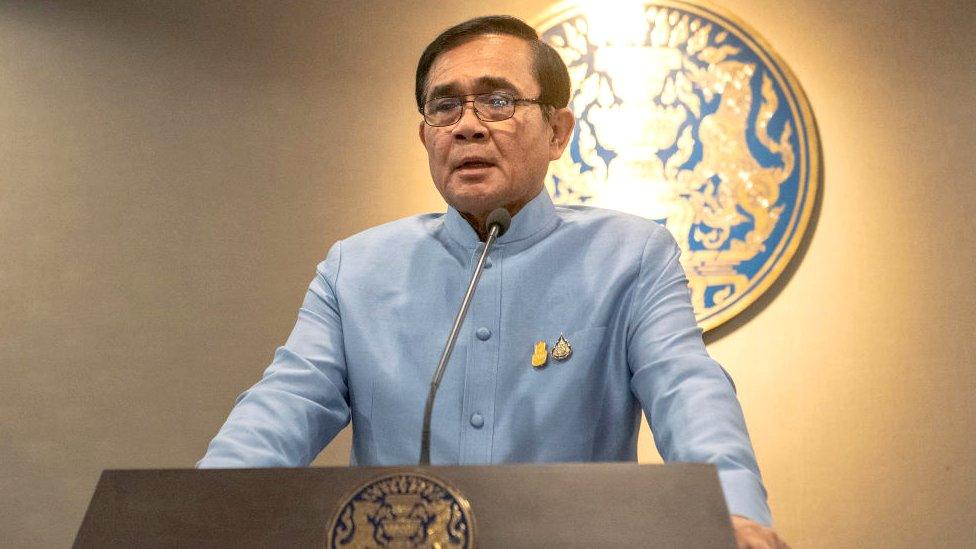Prayuth Chan-ocha: Thai court suspends PM and coup leader
- Published

Prayuth Chan-ocha (pictured in 2020) has been temporarily suspended as a court determines if he's been in power longer than constitutionally allowed
Thailand's top court has suspended prime minister Prayuth Chan-ocha from official duty while it considers a legal challenge to his term limit.
Opposition parties have filed a case arguing that Mr Prayuth - in charge since 2014 - has overstayed his tenure.
Thailand's constitution limits prime ministers to eight years in office.
The ex-army chief first seized power in the 2014 military coup and then retained office in 2019 under a heavily restricted election.
However, in recent years he has been facing growing opposition, and backlash within his own coalition.
So far this year, he has survived multiple no-confidence votes against him.
Opponents and activists have argued Mr Prayuth's term began when he was junta leader. As military leader, he seized power in the May 2014 coup and then appointed himself prime minister of the new military government in August 2014.
That means his term should end this week, his critics say.
However his supporters say his term only began in 2017 - when a new constitution came into force - or even after a general election in 2019 that saw him retain power.
Under those terms, he could technically continue serving until 2027 - if he wins an upcoming general election.
On Wednesday, Thailand's Constitutional Court agreed to hear the case from the political opposition. The bench of judges ruled five to four in support of his immediate suspension.
It's unclear when the court will deliver its ruling on Mr Prayath's case.
Protesters had earlier gathered outside parliament buildings in the capital, Bangkok, demanding his resignation.
The move means Deputy Prime Minister Prawit Wongsuwan, 77, will become the interim prime minister, according to the cabinet line of succession.
Thailand is due to hold a vote before May next year, although the deputy PM had previously flagged it could be as early as November.


The constitutional court is a much-criticised body in Thailand, accused of ruling consistently against opposition parties and in favour of the military-dominated government of Prayuth Chan-ocha.
So there is some surprise that the judges have now decided to suspend him from his job while they consider what to do.
Whether they now go further and rule that he must give up the post completely depends on when they view his term as starting - eight years ago, when he was formally appointed prime minister following his coup, five years ago when the new charter was enacted, or even three years ago, after the first post-coup election saw him reinstated.
The legal arguments for each of these is finely balanced, which raises the possibility that political considerations will decide the matter.
Most Thais expect the court to leave him in his job, and avoid shaking up Thai politics only months before the next election is due to be held.
But General Prayuth has lost a lot of popularity, due to his irascible leadership style and ineffective stewardship of the Thai economy.
He has faced serious challenges from factions inside his own party. Never a natural campaigner, he may no longer be seen as an asset when the election is called.
As always in Thailand, there is also speculation about what the palace wants. King Vajiralongkorn is officially above politics, but many Thais believe his preferences also influence these big decisions.

Related topics
- Published8 September 2020
